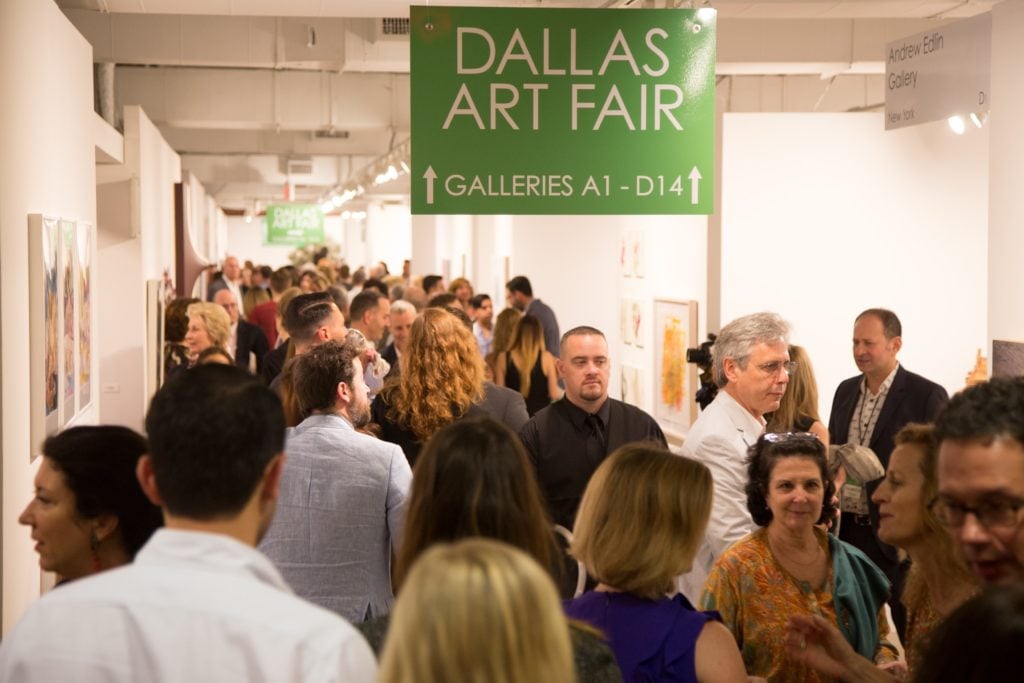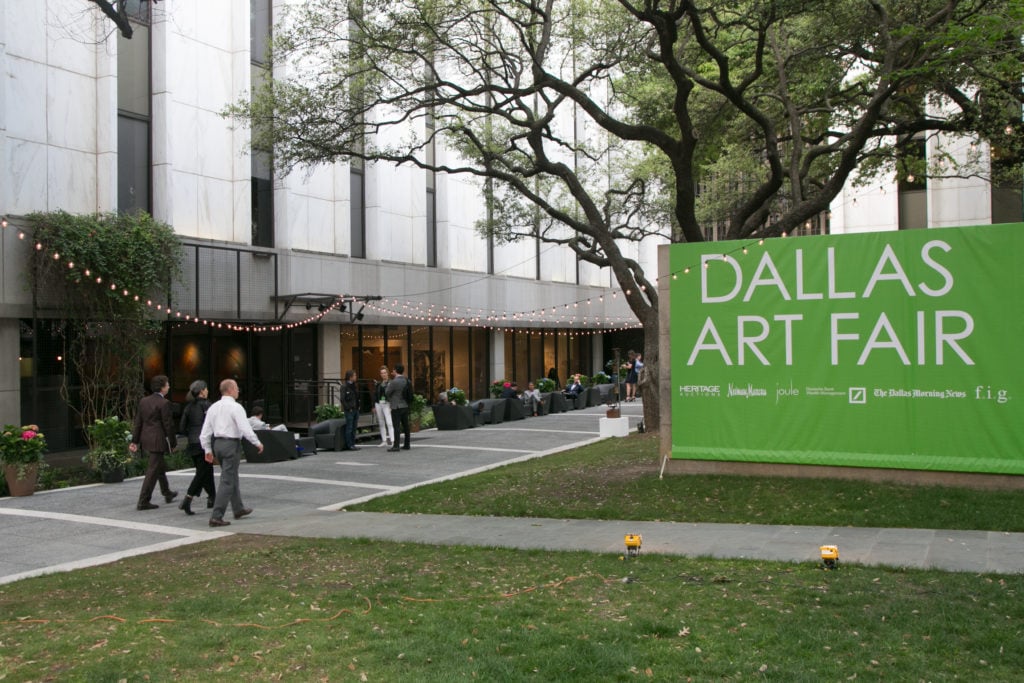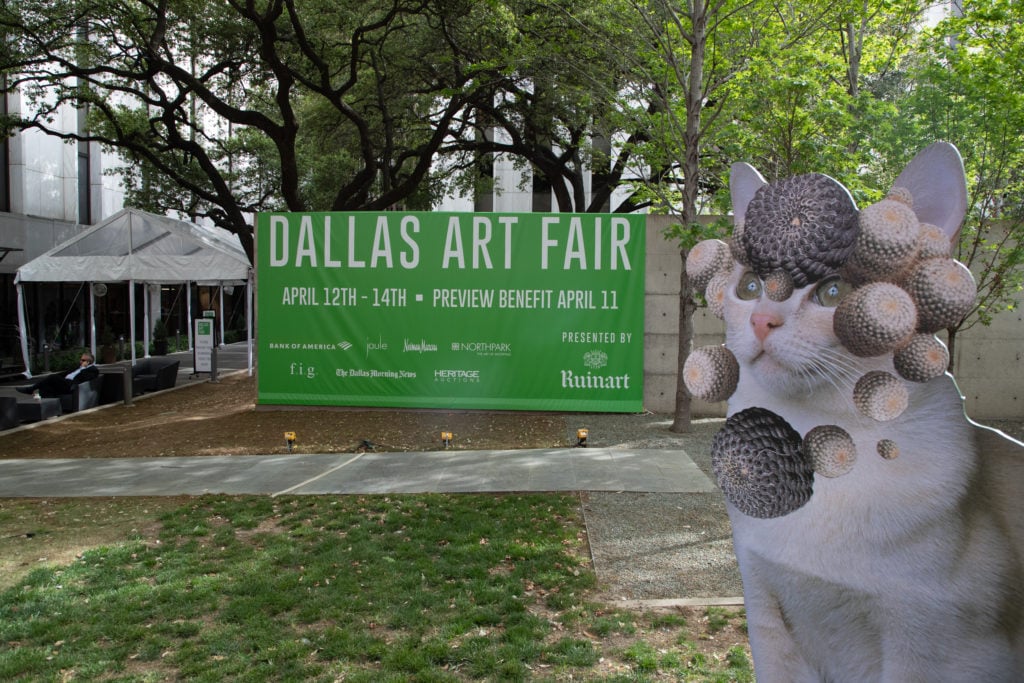As COVID-19 cases continue to climb in Texas, the Dallas Art Fair has cancelled its 2020 edition.
The news comes after the fair postponed its original dates—April 16 to 19—to October soon after the pandemic hit the United States. Organizers mounted an auxiliary digital fair in the spring, but made it clear they still intended to host the proper in-person event later this year.
However, as the virus continues to take its toll on the country—especially in Texas—large events are off the table. And because the fair was cancelled just a couple months out from its rescheduled opening, dealers will not be refunded the booth fees they have already paid, according to The Canvas newsletter, which first reported the fair’s cancellation.
“This has been an extremely difficult decision to make, but with the high number of COVID-19 cases in Texas and global travel restrictions, we have to put the safety of our dealers and collectors first,” the fair’s director Kelly Cornell said in a statement to Artnet News.
The next version of the Dallas Art Fair is now set to take place from April 15 to 18, 2021.

Photo: Dallas Art Fair.
The fair’s cancellation comes as the art business is feeling pressure from all sides. Small and midsize galleries, which represent the majority of the Dallas Art Fair’s exhibitors, are squeezed by the shutdown, which has cut them off from lucrative art fairs. Meanwhile, art fairs themselves are losing money after being forced to cancel; and unlike Frieze or Art Basel, which have substantial backing, the Dallas Art Fair says it can’t afford to offer refunds.
“We are an independently owned business and the fair was timed so close to the pandemic’s outbreak in the US that our vendors had already been paid and we are operating at a significant loss,” Cornell said. The fair, she added, is “incredibly sorry… to make this decision” and is working with “each gallery individually and offering credits towards future fairs.”
At least some galleries have been offered 50 percent of their fees credited to future editions. A clause in the contract signed by participating galleries states that if the Dallas Art Fair “for any reason cancels the fair, the fee shall be returned after deduction of exhibitor’s share of costs incurred or irrevocably committed prior to the date of cancellation.”

Dallas Art Fair. Courtesy of Daniel Driensky.
But some dealers say that a credit for a future fair is irrelevant if their business can’t survive long enough to take advantage of it.
“My booth costs more than my gallery’s monthly rent,” Sargent’s Daughters’ owner and director Allegra LaViola told The Canvas. “It’s one thing for bigger galleries to have their fees applied to the next edition of the fair. But my gallery is based in New York. I don’t know that I’ll even make it to next year.”
Olivia Smith, co-founder and director of Magenta Plains, was more sanguine. “It’s unfortunate, but we have no other option than to accept the circumstances and maintain optimism for the future,” she told Artnet News. “Due to the timing of the shutdown being so close to the fair opening and the fact that the fair’s expenses could not be refunded to them, it’s a cash flow issue. For now, it seems the long-term viability of the fair is contingent on the fees not being refunded to the galleries.”
“Having known Kelly for over a decade, I have no doubt that she explored every option before arriving at this decision.” Smith continued. “Being that the situation is fluid, she has promised to continue to work to find solutions over the next few months.”
London-based dealer Richard Saltoun, who put down roughly $30,000 in full for one of largest stands at the fair, was less pleased with the turn of events.
“There was no consistency in how they have treated their exhibitors,” he said, noting that he heard about the fair’s cancellation through news channels rather than through the organizers themselves. “Those who had the good grace to pay early have been the ones to suffer most financially. Their offer to rollover 50 percent to next year’s edition has not been made to all, and certainly not to us.”
Saltoun said he asked for a refund after the fair was first postponed from April, but was refused.
“At best this is a badly run fair, at worst a dishonest one,” he added.
The digital event held in April in lieu of the then-postponed fair was a surprise hit for Cornell and her team, bringing in an estimated $3 million in sales. The organizers were so pleased with the results that they launched a year-round digital marketplace last month. Even then, they maintained their plans to host the 2020 fair in October. But the number of daily diagnoses of COVID-19 cases in Texas, one of the first states to lift quarantine restrictions, has gone up roughly 500 percent on average since June, according to the New York Times.
Editor’s note: this article has been updated to include additional comments from dealers.











